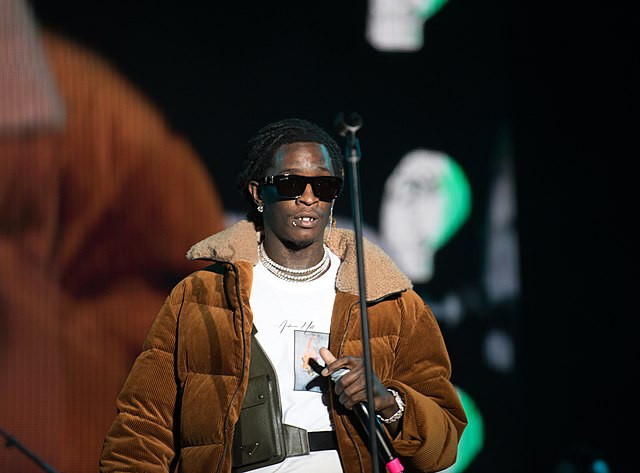Rapper Young Thug, born Jeffery Williams, walked free from a Georgia courtroom on Thursday after being sentenced to time served, concluding one of Georgia's longest-running RICO cases. Following over 900 days in custody, the Atlanta-based artist accepted a non-negotiated plea deal, sparing him from a potential 120-year sentence. He will serve 15 years on probation, facing strict conditions including distancing himself from Atlanta and engaging in community service focused on anti-gang efforts.
Williams, who co-founded Young Stoner Life Records-allegedly also known as the "Young Slime Life" gang-was one of over two dozen defendants originally named in a 2022 racketeering indictment under Georgia's Racketeer Influenced and Corrupt Organizations Act. Prosecutors alleged that the rapper played a central role in a gang that has committed various violent crimes in Atlanta over the past decade. While he had initially pled not guilty, his plea deal marks a turning point in a case that has garnered national attention.
Superior Court Judge Paige Reese Whitaker presided over the case, which involved multiple charges against Williams, including possession of a firearm, participating in a criminal street gang, and racketeering. During his hearing, Williams expressed remorse, taking responsibility for his actions and pledging a change in the direction of his music and public influence. "I am a smart guy. I am a good guy. I really got a good heart," he said, adding, "I find myself in a lot of stuff...because I was just nice or cool."
As part of the plea, Williams will be barred from the greater Atlanta area for the first 10 years of his probation, allowed to visit only for family events and mandatory appearances, and required to leave the city within 48 hours of each visit. Judge Whitaker also stipulated that Williams return to Atlanta four times a year to host presentations addressing gang and gun violence, along with 100 hours of community service annually.
Judge Whitaker emphasized her hope that Williams would be a positive influence moving forward. "I want you to try to be more of the solution and less of the problem," she told him. The rapper responded by recounting past charitable activities, including free concerts and donations to single-parent families, promising to use his influence in constructive ways. He acknowledged the weight of his lyrics, pledging, "I promise you, I'm 100% changing that."
Young Thug's release represents a controversial endpoint in a case that spotlighted the role of rap lyrics in criminal trials. Prosecutors argued that Williams's lyrics and social media posts served as evidence of gang activity. Fulton County Deputy District Attorney Adriane Love, in opening statements, claimed Williams was at the helm of YSL, stating, "The members and associates of YSL, they moved like a pack with Jeffrey Williams as its head." The prosecution pointed to lyrics, images, and other content as "overt acts in furtherance of the conspiracy."
The case raised concerns within the music industry, with artists, producers, and freedom of speech advocates criticizing the use of lyrics as evidence. Many argued that artistic expression was unfairly weaponized, a sentiment that has since fueled the "Protect Black Art" movement. Williams's attorney, Brian Steel, filed motions attempting to block the use of lyrics, asserting that "[Lyrics] cannot be used as evidence of crime if they are simply connected to music/freedom of expression/freedom of speech/poetry." Although Judge Ural Glanville, who presided earlier in the trial, denied this request, the motion resonated broadly in the entertainment industry.
Throughout the trial, which began in November 2023, several co-defendants accepted plea deals or were severed from the case. Fellow rapper Gunna and other defendants agreed to plea deals that resulted in time served or reduced sentences. This week, three more co-defendants, including Rodalius Ryan, known as "Lil Rod," Marquavious Huey, and Quamarvious Nichols, entered plea agreements that commuted portions of their sentences or dismissed additional charges.
Young Thug's star power has drawn considerable attention to the proceedings. The artist's plea marks a stark shift for a figure central to Atlanta's music scene, with supporters citing his charity work and influence. His father, Jeffrey Williams Sr., reflected mixed emotions following the verdict, saying, "I feel great that he's going home, but at the same token, I still wanted him to fight. But that's his decision."
The Georgia case reflects a growing national debate over the use of artistic work in criminal prosecution. In response to public outcry, numerous hip-hop artists have rallied around Young Thug, arguing that rap music is a form of expression that should not be equated with real-life actions. The "Protect Black Art" movement has since gained momentum, underscoring the cultural implications of Young Thug's case.
Williams's probation will require strict adherence to court-imposed guidelines. Along with community service and public speaking engagements, he is barred from any direct contact with known gang members or associates and prohibited from possessing firearms. Whitaker's sentencing reflects both an opportunity for rehabilitation and a heavy penalty for a figure she believes can shape a constructive narrative for youth at risk.





